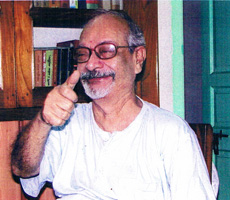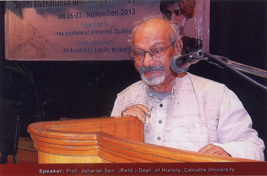| My grandmother, Subhasini Sen, was a devout Vaisnav lady. The be-all and end-all of my mother’s life (Hemnalini) was the home and the family. My father, Khagendranarayan, a lawyer by profession, was blessed with a perpendicular character. My indebtedness to them is too deep for words.
In 1932 I was born in Rajshahi district (now in Bangladesh). My student life started in a pathsala (traditional pre-primary private school) situated in a thatched hut. The guru (teacher) was a purohit (a priest) who taught us alphabets and simultaneously transacted soda-water manufacturing business. I was a student of Loknath High English School which was established in 1846. I studied in this school during 1939-46.Our family could feel the impact of Second World War, August Movement (1942), Great Famine (1943) and Pre-Partition political upheaval.
There were various types of cultural organizations like the Alapani Club, the Arrowhead Club (led by Ritwik Ghatak, the world-famous Cinema Director), Asareh Club (led by Radhika Mohan Maitra, the eminent Sarod Player), branches of Manimela (led by Bimal Ghosh nicknamed Moumachi, an organization of the Ananda Bazar Patrika), Chotother Pattari (led by Akhil Neogi, nicknamed Swapanburo, an organization of the Yugantar Patrika). The branches of Azad Hind Fouz and Rastriya Swayam Sevak Sangha were very active in our locality. All these institutions played a great role in moulding the mental world of the young students in the district town.
 After the Partition of Bengal our family migrated to Berhampore, West Bengal. I passed Matriculation Examination from the Nawab Bahadur Institution, Murshidabad. I was a student of I.A. class during 1948-50 in Berhampore Krishnath College. I graduated from Krishnagar Government College in 1952 and passed M.A. Examination in History and LL.B from the Calcutta University in 1955. I obtained Ph.D. degree in 1974 from the University of Calcutta for my dissertation, Indo-Nepal Trade in the Nineteenth Century. The entire span of my student life in the colleges (1948-52) and in M.A. and Law classes (1952-55) is a tale of my involvement in revolutionary socialist movement. After the Partition of Bengal our family migrated to Berhampore, West Bengal. I passed Matriculation Examination from the Nawab Bahadur Institution, Murshidabad. I was a student of I.A. class during 1948-50 in Berhampore Krishnath College. I graduated from Krishnagar Government College in 1952 and passed M.A. Examination in History and LL.B from the Calcutta University in 1955. I obtained Ph.D. degree in 1974 from the University of Calcutta for my dissertation, Indo-Nepal Trade in the Nineteenth Century. The entire span of my student life in the colleges (1948-52) and in M.A. and Law classes (1952-55) is a tale of my involvement in revolutionary socialist movement.
Regarding choice of profession, I was haunted by a Jenus-headed problem: hereditary profession of a lawyer or avocation of a college teacher. The choice of the latter was imperative. The span of my service life as a teacher of History in different colleges stretches over more than fifty-five years. It started in November 1956 when I joined Diamond-Harbour F.C.College. I worked in the Department of History, Berhampore Krishnanath College from August 1957 to September 1961.As a member of the West Bengal Educational Service I served in a number of Government Colleges from September 1961 to February 1975. I joined the Department of History, Calcutta University on 4 February 1976, retired on 30 June 1992 and continued as a reemployed teacher till 30 June 1997. I was associated with the Department as Honorary teacher for several years. From 1 March 1986 to November 1989 I was a Fellow, Indian Institute of Advanced Study, Simla. In 1999 I was a Visiting Fellow in the Department of History, Rabindra Bharati Unuversity. I was a Guest Lecturer, in the Department of Indology, Ramkrishna Mission, Institute of Culture, Golpark for five years since 2000. I am now a member, Committee of Management, Gandhi Smarak Sangrahalaya, Barrakpur, West Bengal.
In Darjeeling Government College, I worked for six years (1962-68) during a very crucial period of Indian history. I had inter-communication, with all classes of people, including Tibetans and Nepalis. At the same time I had free access to District Records bearing on affairs of the frontier and also to literature in Lepcha, Tibetan and Nepali languages. The libraries of Darjeeling Mountaineering Institute and Sikkim Research Institute of Tibetology, Gangtok introduced me to the Universe of Himalayan studies and mysticism of the Tibetan World. My association with some saintly scholars, whom I met as Fellows in the Indian Institute of Advanced Study, Shimla has always been a constant source of inspiration in my struggle to get rid of mental jamming.
His field of specialization is Himalayan Studies. Notable among his publications are Indo-Nepal Trade in the Nineteenth Century (1977), Asiar Jatiya Mukti Andolan (National Liberation Movement in Asia, 1980), Dakxin Purba Asiar Itihas; Malay ebong Indonesia (History of South-East Asia; Malay and Indonesia, 1985, rpt.1996), Darjeeling, a Favoured Retreat (1989), Essays in Indo-Nepal Trade (1991), India and Nepal:Some Aspects of Culture Contact (1992), Rejaul Karim (in Bengali,2000), Puma Manab Rejaul karim (Rejaul Karim, the Integral Man, 2003): Nabya Alberuni Rezaul Karim (Rejaul Karim, the Modern Alberuni, 2006), E Yuger Chinkatha (China in Modern Times, 2007) and Tibbater Akashe Laltara (Red Star Over Tibet, 2009). In 2003 he edited a book entitled, Life and Light: Perspective on Learning in Living and Living in Learning which contains inter alias the Convocational Addresses of Sir Gooroodas Banerjee, the first Indian Vice.-Chancellpr of the Calcutta University. On 11th September 2009, Prof. Sen has been honoured by the Calcutta University for ‘outstanding contribution to teaching and research as an eminent teacher. Two books have been recently published : Nirbachita Rabindra Bhasan (Select speeches of Rabindranath, 2010) and Gandhi Pather Digdarsan (Understanding the Gandhian Way, 2011). My latest book, Himalaya Charcha Ebong Darjeeling Prasanga ( Himalayan Studies and Darjeeling Affair) is in press. Currently I am engaged in research on two vital aspects of Gandhian legacy, namely, “Gandhiji’s Religion” and “Gandhian Ashrams”. I have contributed a large number of articles in Bengali and English to edited books, journals and weekly and fortnightly newspapers. I firmly believe that a teacher is always a teacher, the teacher, every inch a teacher and, above all, a continuing student throughout his life.
 In 2014 I have been elected President of Rezaul Karim Academy, Berhampore, Murshidabad, West Bengal. In 2015 I have been selected editor of Gandhi News, the bullitin of Gandhi Museum, Barrackpore, West Bengal. Both organizations deal with basic problems confronting human civilization to-day. The inspiration that I have derived from the responsibility conferred on me is too deep for words. In 2014 I have been elected President of Rezaul Karim Academy, Berhampore, Murshidabad, West Bengal. In 2015 I have been selected editor of Gandhi News, the bullitin of Gandhi Museum, Barrackpore, West Bengal. Both organizations deal with basic problems confronting human civilization to-day. The inspiration that I have derived from the responsibility conferred on me is too deep for words.
I have passed four score of years in life. My Faith is rooted in some common maxims of convictions. These are as fellows:
- The course of the river of life is unpredictable.
- The message of love delivered by prophets and elixir of love experienced by Jiva is indefinable.
- I wish to be reborn in a world without politics and society without religion. Both politics and religion are unnecessary for a better future of mankind.
|
My book in Bengali Himalaya Charcha and Darjeeling Prasanga (HIMALAYAN STUDIES AND DARJEELING AFFAIRS) KOLKATA: Chikitushi Prakashani, 2013 (ISBN No 81-922920-8-8) is aimed at fostering the bonds of compassionate identity that bind together the people of hills and those of plains.
The subject matter is comprehensive. Here are some glimpses of each chapter.
1. The Himalayas in ancient Indian Literature, the Himalayas as cradle of Asian Civilizations and meeting-ground of World Religions, Buddhism in Tibet and Mongolia, the trend of contemporary Himalayan Studies.
2. The emergence and development of Nepali Literature in Benaras, Assam, Drajeeling and Sikkim.
3. The cultural pluralism in Darjeeling, the importance of toponym in Sikkim and Darjeeling, the Rongs and their language, the Tibetan cultural tradition, the Tamang tradition; the Nepali language as vernacular and medium of instruction, the Bengali culture.
4. The Movements of Autonomy of Indian Gorkhas: Explanation of the term ‘Gorkhas’, Recruitment of the Gorkha soldiers in Darjeeling, Hillmen’s Association, All India Gorkha League; Deradun and Darjeeling, the weekly journal Gorkhali, Confidential report of the British Secret Service, Proposal for formation of a separate Uttarakhand province; CPI’s proposal for a Gorkhsthan province.
5. Changes in the political scenario in Darjeeling District: A brief history of pre-1947 Darjeeling, the nature of Gorkhaland Movement, Prasanta Tamang as a catalyst; Darjeeling Gorkha Hill Council, the Gorkha Territorial Administration.
The Appendices contain a letter from Subhas Chandra Bose, a message from Kailash Nath Katju, the former Governor of West Bengal and a memorandum submitted by Dr. Maitreyi Bose, an ex-M.P. on the question of inclusion of Nepali language in the Eighth Schedule of the Constitution of India.
The Bibliography contains relevant books and articles in English, Nepali and Bengali languages.
I hope to concentrate in future on the lives and works of the pioneers who loved Darjeeling intensively and explored inexhaustible store-house of knowledge.
My Three books are in the press, Those are : Religion of Gandhi, Early Life of Gandhi, Gandhi and Modenization.
It is
expected that the books will release during the next bookfair 2017.
Saadi of Siraz, a Sufi of thirteenth century, wrote;
A raindrop, dropping from a Cloud,
Was ashamed when it saw the Sea.
‘Who am I where there is a sea?’ it said.
When it saw itself with the eye of humility,
A shell nurtured it in its embrace.
I was born in a thatched hut near a pond in a locality called Kadirganj in the district of Rajshahi in Bangladesh. The Padma River there and the Ganges at Berhampore have sustained and nurtured me. The Himalayas provided me an abode of peace. |